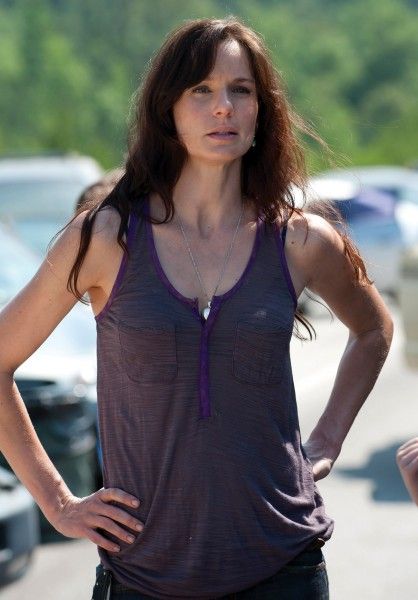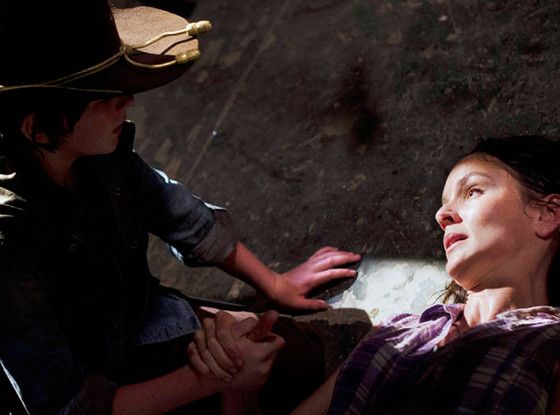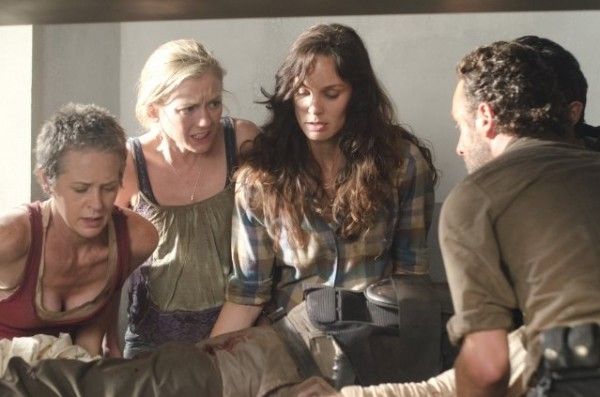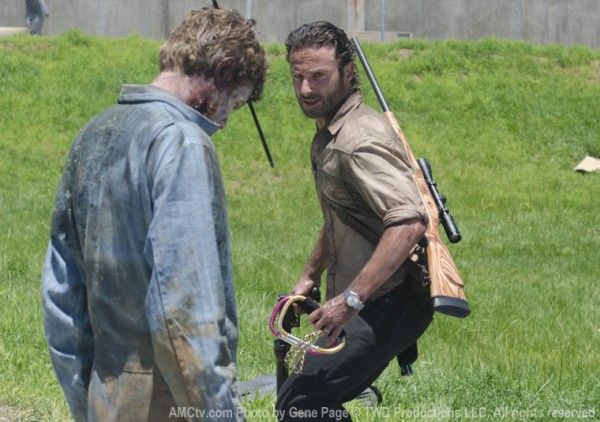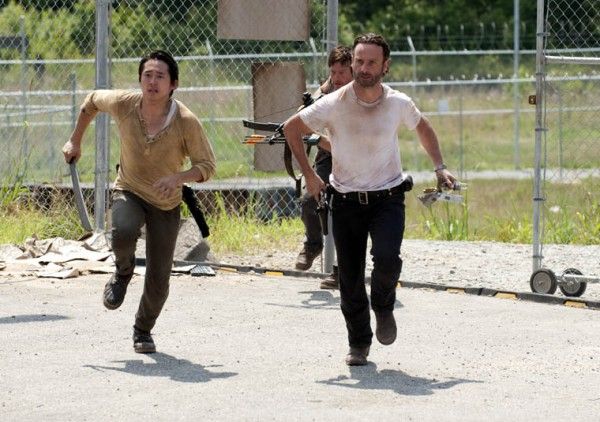The hit AMC drama series The Walking Dead is back for Season 3, with higher stakes, more threatening human villains and, of course, plenty of zombies. The writers and producers have never been afraid to take the story where it needs to go, regardless of who ends up becoming a casualty and what the ripple effect is on those who survive, with this last episode being the perfect example of that.
During this recent interview, actress Sarah Wayne Callies talked about having to get to the level of emotion needed for the episode, what it’s been like to work with Chandler Riggs (who plays Rick and Lori’s son, Carl), what sort of input she had, what it’s meant to her to play Lori Grimes, what the fan reaction has meant to her, and her favorite moments with Andrew Lincoln. Check out what she had to say after the jump, but be aware that there are spoilers.
Question: As an actress, how did you get to the level of emotion for this final episode?
SARAH WAYNE CALLIES: Well, Lori's death is very unique, among the ones we’ve had on The Walking Dead because it’s one that she’s chosen. It was an interesting tone because it’s not surrounded by quite the same level of crisis and panic, although it’s clearly a situation where things are going to go badly, with or without her choice, and it’s a pain for us to admit that. It has to do with the work we’ve done for the last two and a half years. I can’t imagine doing a scene like that, as the first scene of a movie with an actor you don’t have a strong rapport with and in a character you don’t know quite as well. There is something about a scene like that where you are just present and you support one another and create an environment where anything is okay. It was pin-drop quiet, through that whole scene. We didn’t close the set. The whole crew was there, and there was a level of concentration and respect and focus, from all 80 people who were there. It was remarkable. It was probably also significant that the entire cast showed up. I finished the scene and, when I came out, there was almost every single member of our cast that had just come to sit and watch and be there. It was important for Chandler [Riggs], so that he was surrounded by the people that he would be moving on with.
How was it to work with Chandler Riggs, through all of this?
WAYNE CALLIES: It was difficult, I’ll be honest. Chandler and I really didn’t talk at all, the week that we were shooting that, because we couldn’t look at each other without losing it. I love that kid. When we lost Jon [Bernthal], Andy [Lincoln] and I were there and we put our arms around him and said, “You have us.” I felt like a bit of a jerk having to reassure this young man that I would be there for him, and then taking off five episodes later. But, he’s in very good hands with that cast and crew, and he’s a remarkable professional. I know he’ll be fine.
Towards the beginning of this show, you talked to Frank Darabont and said that you were interested in seeing Lori die. Did you have any creative input on either the script or how she died, in the episode?
WAYNE CALLIES: Well, Frank and I talked a lot about the necessity of Lori dying, and he fought me on it. He said he thought he had a way around it. But, we never got a chance to see how that would work out. Glen and I talked about it a lot, as well, and not just what that scene would be like, but how we owned that moment through the first two episodes of the season. Originally, there was a different timeline and we had longer to build to that moment. So, when it got shortened, we talked about what we needed to do this, and what pieces had to be in place both for Lori and Carl and for Rick, for his development, later in this season. It is an intimate process because Glen lost his mother shortly before this season. I was very aware that this was a scene that he had written about a woman saying goodbye to her son, having just said goodbye to his mother and heard many of those words. With the actual script, we batted ideas and lines back and forth for about two weeks, and what we shot was a combination of those efforts. There were a couple of things that I said that weren’t on the page, but were a product of sitting with Chandler in a room and trying to say goodbye to him. It was just a great gift of a scene to me, as an actor. Not that it’s all about me, but I’m an actor, so it’s all about me, right? The great gist of that scene, to me, was that I got to say everything I wanted to say to him, and to the show and the cast. People ask me, “How does it feel to leave the show?,” and I just want to say, “Watch the episode and you’ll know exactly how I feel,” because it’s all there. In a lot of ways, it was a collaboration. There were some very specific things that mattered to me, in the third season, and redemption was a big part of that. I wanted a sense of redemption in her marriage and a sense of redemption with Carl. I don’t think either of those were achieved completely, because that would tie things up in a package that is far too neat for our show, but we took steps down that path, in a way that I think not only dramaturgically changes the show, but in a way that I’m grateful for, personally. I have such profound affection for Lori.
What did it mean to you, to play Lori Grimes?
WAYNE CALLIES: Oh god, the world! I loved Lori. I love Lori. She is one of those characters that I think will live in my heart, for a long, long, long, long time. I learned so much from her. One of the things that I’m most grateful to the show for was, early on, when I had my first conversation with Frank, we agreed that we wouldn’t do the TV version of this. Lori was not going to be some big-busted, beautiful woman with perfect hair, who was a slave to the apocalypse. We talked about doing the ugliest, dirtiest, most dangerous and sometimes unlikable version of this that we could. And then, you’d get the script and realize that he never chickened out. I remember going to set, the very first day, wearing less make-up and having my hair look like a mess, in clothes that were dirty and torn and a size too big. Frank looked at me and went, “Perfect!” I’ve never worked on a show where the producers wouldn’t go, “Well, at least put on some lipstick and comb your hair, and for crying out loud, let’s give her a better shirt!” There was none of that, not for a second. It was so exhilarating to be able to dig deep into the darkness of motherhood and marriage because this is very dark enterprise. To have the courage to say, “We’re going to tell this story, in a way that’s never been told before,” was remarkable. It’s the best work I’ve ever done on camera, and that’s because the material is so strong and because of all of the amazing people that I’ve had the chance to act with. They made the same commitment and really chose to do the honest version, instead of the appealing version. It’s an experience unlike anything I’ve ever had, and I’ve learned so much from it. I love Lori so much. I love her passion and fire, and her lack of vanity, and I am going to miss her.
How do you think Lori’s absence will affect Carl?
WAYNE CALLIES: Carl is a force to be reckoned with. I think that it’s very telling that Lori isn’t worried about Carl. She tells him, “You’re going to be fine.” Her soul is through that entire scene with Rick. The most important thing to her is that Rick does not see her as a walker and have to put her down. She almost says to Carl, “Take care of your daddy because your daddy’s going to fall apart.” I think that signals a scene change. For the first two seasons, Carl wept in our arms. Anywhere Carl was within an arm’s reach, Lori was always wrapping her hand over his shoulder. He has evolved, partly due to what a remarkable actor Chandler Riggs is. He’s evolved into a child solider, and all of the deeper unsettling power that that brings with it. With Lori’s death, there is a change in the balance between Carl and Rick.
Since you talked to Frank Darabont about Lori's death, back in Season 1, does that mean that you knew, from the get-go, that this was going to happen, at some point?
WAYNE CALLIES: I knew from the get-go that Lori died in the comic books, so I came to this job assuming that she had an expiration date. There was the death of Shane and the death of Lori. To me, those were very difficult things to get around. Frank said, “I’ve never had a leading lady argue her way off the show.” In the books, Rick goes nuts because his wife dies. Lori had to be a big girl to make that call. I can’t wait to see those episodes afterwards, to see what happens to her.
Most mothers would sacrifice for their child, but do you think she cared about whether this is Rick or Shane’s baby?
WAYNE CALLIES: I don’t know if that is something that anyone’s really going to be able to determine. We talked about that a lot. In a world where there are no paternity tests, there’s no way to know if it’s either Rick or Shane’s. From the beginning, I think Lori saw this pregnancy as a death sentence. Her decision to throw up the Morning After pill that she took last season was her decision to say, “Okay, I’d rather die for the baby, or I’ll die with the baby.” I remember being pregnant and being nervous about all the things that could go wrong, and I had the best midwives in the world and a hospital 10 minutes away. So, I put myself in Lori’s shoes, knowing that there’s no medical intervention, no prenatal care, and no nutrition of the kind of level that you would want. And knowing how stress affect a pregnancy, she could have been at seven months and the baby could be wildly premature. So, I think she slept so many nights, lying awake with these questions buzzing around in her mind, such as, “Will Rick accept the child? Will the child have a chance?” I think those were things that she had settled the most in her own mind, and with her god and conscience, to know that she’d done everything that she could. Clearly, Hershel and Carol were taking the best care of her that they could, and she trusted that they would find a way to keep that baby alive, if they could. There are obviously huge questions now like, “How do they feed a newborn?” But, those are questions that they would’ve spent a lot of time around a campfire at night, in this long dark winter that they just came out of, addressing over and over and over and over, to come up with a plan.
What was it like to have that final scene with Maggie and Carl, but not with Rick?
WAYNE CALLIES: It wasn’t about how gross it was that they were cutting a lady open and yanking a baby out of her belly. It was about people. In terms of the composition of the characters in that scene, the whole conversation that Lori had with Maggie was about trying to get her to step up and be a matriarch. She asked her to do something that only the strongest people would be able to pull off. Maggie is a young woman. She’s Glenn’s girlfriend and she’s Hershel’s daughter, but she hasn’t necessarily come into her own, as a woman. This is the wrong phrase, but Lori basically tells her, “You’ve gotta man up. It’s time to put away your fear and your tears and your, ‘I can’t do this,’ and do what has to be done, right now.” If there were anyone else around, Maggie wouldn’t do it. Hershel would do it, or Rick would do it, or Daryl would do it. Quite frankly, who better to cut open a living creature than Daryl? Anyone else was better suited than Maggie, but Maggie was the one who was there, so Lori had to turn her into a matriarch in the space of two minutes, in order to save her baby’s life. That’s a remarkable story. Likewise, Carl had to become a man in the space of the same two minutes because there was no one else to put Lori down and no one else to be the bearer of her final words. Maggie was clearly on the verge of hysterics, but also having to focus on this C-section. Carl had to take from Lori the last thing that she says and carry that into the future, which is an enormous burden. It’s an amazing composition because you take a young woman and a young man, and Lori’s final act was to turn them into the adults that could do what needs to be done to keep the baby alive. What happens to Rick, later in the season, is that he has to replay that thing between the two of them, at the end of Episode 2, over and over in his head and go, “Why didn’t I tell her that I loved her? Why didn’t I say, ‘I forgive you’? Why didn’t I say ‘I’m sorry?’” I think that’s the part of the show that’s honest. We’ve all lost people thinking, “I was supposed to have more time. We were supposed to be able to have that last conversation when things were better.” Lori and Rick lived an entire winter knowing the stakes of this world where anyone goes, at any moment, but they were still so mired in self-hatred and grief and loss that they hadn’t been able to summon it. There’s a cost to that. There’s a cost to keeping silent, instead of saying what you should have said. For better or worse, Rick is about to bear that cost.
How has it been to hear some of the public reaction towards Lori, when you were just trying to be honest about the character?
WAYNE CALLIES: To be honest, I don’t get into any of that stuff. I’m aware that it’s there because I’ve been told. What I read are the people who take the time to write me. What I read are the fan letters that come to me in the mail. That’s between 20 and 50 letters a week, of people saying, “I love Lori. I love the work. I believe her. I’m a mom, and it’s nice to have a woman that I can relate to.” Those letters are overwhelmingly positive. I’ve actually never had anybody write to me and say, “I’ll take you autograph because I like the show, but I hate Lori.” Those people may be out there, but as far as I’m concerned, there’s a reaction among a certain demographic of people who watch the show and take the time to go online and sound off about it. The last character I played, on Prison Break, was an angel and people loved her and were very supportive, and that felt good. But, coming off of that show, one of my concerns was not to get stuck playing our lady of sorrows, who always does the right thing and stands by her man. I loved playing that role on Prison Break, but part of why I wanted to play her really was because I found her to be a very different kind of a woman. So, hearing that people were going online to talk about how is she a good mother and a good wife was gratifying for me because it was evidence that I haven’t played the same character, back to back. I’m growing as an artist and expanding my range, and not pigeonholing myself by doing the same thing, over and over.
When you’ve done those scenes with Andrew Lincoln, where you’re not talking, but there’s obviously a lot going on between the two of you that’s unsaid, what sort of things were going through your mind, as far as the way you were playing the character, in those moments?
WAYNE CALLIES: That’s interesting. The way that I was taught, as an actor and with my training, and I believe Andy’s as well, because we both come out of conservatory programs, was that the most effective things you can do is to have your brain be chattering away the way everyone’s brain chatters away, whether you’re talking or not. Your work isn’t just to learn and say the lines. Your work is to figure out what the chatter in your brain is, that’s going on under the lines. It doesn’t matter whether you’re speaking or not speaking because your mind is working the way your character’s mind would work. Some of my favorite scenes with Andy are the ones where one or the other of us doesn’t talk much. One of my favorite scenes was at the end of the second season, where he tells me that Shane is dead. I don’t really say anything in that entire scene, except at the very beginning. There was a whole dialogue between us that happens non-verbally. In a way, that’s my favorite kind of work to do because it can be different, every take, and you can play with it. You can change the response on your face, and that shift can skew the whole scene. Andy is such a marvelous actor that you just play together and figure that out.
How did you find out when and how Lori would die?
WAYNE CALLIES: When they told me Lori was going to die, they pitched me what they had as an idea for how. My first question actually was, “Does the baby make it?” They said, “Yes.” For some stupid reason, it made all the difference. I was like, “Okay, well, as long as the baby makes it, that’s good.” Anyone who has read the comic book is so familiar with the way Lori died, but I think they’d see it coming a mile away. It really just made good sense to change the circumstances. Lori was one of three characters from the pilot who were still alive, and now there's only two with Rick and Carl. There’s the sense that maybe viewers needed to hear her say something and not just die anonymously. I don’t know. You’d have to ask the writers that because, from the beginning, when they called and said, “You’re going to go in Episode 4,” they went on to say, “You’re going to sacrifice yourself for the baby and say goodbye to Carl, and Carl is going to have to shoot you in the head.”
In the comics, Lori does come back to haunt Rick in visions. Would you be open to returning in such a capacity?
WAYNE CALLIES: I think that question has to do with, “Does it serve the story?” I’ve always felt that Lori’s death was something very important to Rick, which drives him crazy. In the comics, part of his madness is not quite being able to shake her. If that serves the story that they’re going to tell going forward, then absolutely. I can’t really envision a time where somebody calls me up and goes, “Hey, we wrote something for you,” and I go, “No.” I don’t quite see that happening. At the same time, we’ve taken so many departures that, if they feel it would be foolish for Rick to be seeing ghosts, I’m okay with that, too. Anything that serves the story.
Do you have any idea what your next role is going to be?
WAYNE CALLIES: I actually finished my next project already because I finished shooting The Walking Dead in the middle of June. At the beginning of July, I worked on a movie called Black Sky, which is my first experience doing a big-budget effects movie where somebody’s life is in jeopardy, pretty much every second. It’s about surviving a tornado and about the ways in which people who are strangers can become quite important to one another, quite quickly in crisis. I completed that just a couple weeks ago, with Richard Armitage. With The Walking Dead, that family was one that I really built so consciously and it meant so much to me. It’s a real gift that, two weeks after I walked off that set, I walked onto another one, and really got to sink my teeth into another character and another story. I could take everything that was learned from The Walking Dead and try to put it into practice. Also, while I was still grieving for the loss of the show, it was nice to have something creative to focus on. I got cast in the movie and Andy said, “Oh, you’re just going to love Richard. He’s marvelous.” And then, I met Richard and said, “Oh, didn’t you love Andy? He’s marvelous.” It’s just felt like we were all working in the same community, in a way.
The Walking Dead airs on Sunday nights on AMC.


